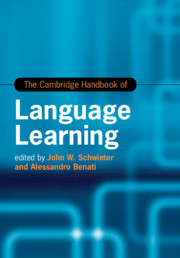Book contents
- The Cambridge Handbook of Language Learning
- Cambridge Handbooks in Language and Linguistics
- The Cambridge Handbook of Language Learning
- Copyright page
- Contents
- Figures
- Tables
- Contributors
- Acknowledgements
- Introduction
- Part I Theories
- Part II Methods
- Part III Skill Development
- 10 Interaction in L2 Learning
- 11 Speaking
- 12 Second Language Listening: Current Ideas, Current Issues
- 13 Contemporary Perspectives on L2 Upper-Register Text Processing
- 14 Language Learning Through Writing: Theoretical Perspectives and Empirical Evidence
- Part IV Individual Differences
- Part V Pedagogical Interventions and Approaches
- Part VI Context and Environment
- Part VII Moving Forward
- Index
- References
14 - Language Learning Through Writing: Theoretical Perspectives and Empirical Evidence
from Part III - Skill Development
Published online by Cambridge University Press: 25 June 2019
- The Cambridge Handbook of Language Learning
- Cambridge Handbooks in Language and Linguistics
- The Cambridge Handbook of Language Learning
- Copyright page
- Contents
- Figures
- Tables
- Contributors
- Acknowledgements
- Introduction
- Part I Theories
- Part II Methods
- Part III Skill Development
- 10 Interaction in L2 Learning
- 11 Speaking
- 12 Second Language Listening: Current Ideas, Current Issues
- 13 Contemporary Perspectives on L2 Upper-Register Text Processing
- 14 Language Learning Through Writing: Theoretical Perspectives and Empirical Evidence
- Part IV Individual Differences
- Part V Pedagogical Interventions and Approaches
- Part VI Context and Environment
- Part VII Moving Forward
- Index
- References
Summary
This chapter contributes a review of theoretical perspectives and selected empirical studies on how and why writing can be a site for language learning. This area of scholarly interest, a newcomer to language learning studies, has been characterized as “a well-defined space for a future research domain at the intersection between L2 [second language] writing and SLA” (second language acquisition; Manchón, 2011a, p. 62) whose key research preoccupation can be encapsulated in the following question: “Can the processes involved in writing—planning, composing, reflection, monitoring, retrieving knowledge, and processing feedback—promote L2 acquisition?” (Manchón & Williams, 2016, p. 569).
Despite its short history, this research domain is gradually developing into a vibrant strand with a rich scholarly output that includes theoretical accounts of the language learning potential of L2 writing and written corrective feedback (WCF) processing, together with an expanding body of SLA-oriented empirical research.
- Type
- Chapter
- Information
- The Cambridge Handbook of Language Learning , pp. 341 - 362Publisher: Cambridge University PressPrint publication year: 2019
References
- 25
- Cited by

